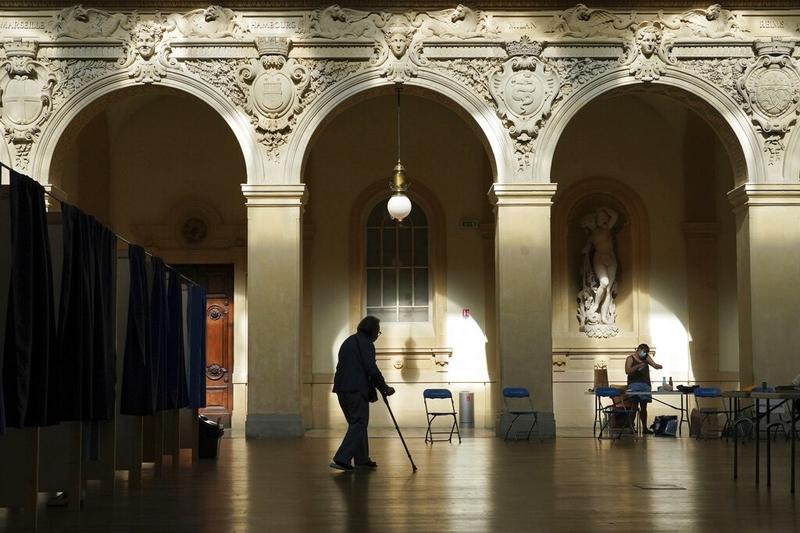Parties of president, top rival left trailing in regional polls with record-low turnout
 A voter exits a voting booth in Lyon, central France, on Sunday. Leading politicians are using the regional elections as a platform to test ideas and win followers ahead of the April presidential election. (LAURENT CIPRIANI / AP)
A voter exits a voting booth in Lyon, central France, on Sunday. Leading politicians are using the regional elections as a platform to test ideas and win followers ahead of the April presidential election. (LAURENT CIPRIANI / AP)
The centrist and far-right parties that respectively represent French President Emmanuel Macron and his main rival Marine Le Pen both fared worse than expected in the country's first round of regional elections on Sunday marred by a record-low voter turnout.
Rival Marine Le Pen, whose then-National Front party won 27 percent of the vote in 2015, was hoping to take at least one regional council to give a boost to her campaign
Both trailed Les Republicains, or LR, a traditional liberal conservative party.
An Ipsos exit poll shows that the LR received 27 percent of the vote, followed by Le Pen's National Rally, or RN, with 19 percent. The Greens, the Socialist Party and Macron's La Republique en Marche, or LREM, are all on 11 percent, above the 10-percent threshold for entering the second round of elections on Sunday.
Aurore Berge, a spokeswoman for the LREM, described her party's poor performance as a "democratic slap in the face for all of us".
It was the first time that the LREM participated in regional elections. The party, founded by Macron in 2016, did not exist in the last regional elections held in 2015.
ALSO READ: France's Macron slapped in face during walkabout
There was little expectation earlier that Macron's party, the ruling party at the national level, would do well in the elections but the Sunday result was worse than expected and has been interpreted as a sign that the party has failed to turn its five years in power into grassroots public support.
The regional elections were postponed for three months due to the COVID-19 pandemic, which has hit France badly. Only 34 percent of the voters turned out on Sunday, with a staggering abstention of 66 percent.
Le Pen's RN has fallen well short of the high expectations before the vote. She described the record-low voter turnout as a "civic disaster".She also blamed it on the government's inability to inject faith in French political institutions and urged her supporters to show up next weekend.
A historic abstention
"Let's face it, the results were marked by a torrential and also historic abstention of nearly 70 percent due to the mistrust of an electoral system, which leaves voters with the feeling that nothing can change, that everything has been confiscated," she said.
Le Pen, whose then-National Front party won 27 percent of the vote in 2015, was hoping to take at least one regional council to give a boost to her campaign. But the much-anticipated race in Le Pen's southern region of Provence-Alpes-Cote d'Azur turned out to be much tighter.
The RN's candidate Thierry Mariani won 33 percent of the vote ahead of the 30 percent by LR candidate Renaud Muselier, who is also supported by Macron's party, according to OpinionWay for CNews exit poll. Another poll put them even closer.
In the northern region of Hautsde-France, the conservative Xavier Bertrand obtained 41 percent of the vote, compared to 26 percent for the RN.
Bertrand declared triumphantly on Sunday evening with a statement saying that he had "broken the jaws" of the RN.
Last year, Bertrand expressed his interest to challenge Macron in the 2022 presidential election. Polls have shown that he is third behind Macron and Le Pen.
The impact of the pandemic and the low interest in regional elections are believed to have contributed to the record low turnout. Those who did show up to vote had to wear masks, observe social distancing rules and carry their own pens to sign voting registries.
READ MORE: Macron's premier rejects veil ban for Muslim girls in France
The regional elections are often about local concerns such as schools, transportation and infrastructure. But this time it has been seen by many as a test of public sentiment ahead of the 2022 presidential election to be held next April. Candidates who intend to challenge Macron have cashed in on the opportunity to attack his handling of the pandemic.
Carl Bildt, co-chairman of the European Council on Foreign Relations, said that the low turnout makes it difficult to draw too serious conclusions from the regional elections in France.
"But it's still obvious that the far right did less well than many had expected," he said in a tweet on Sunday night.
Agencies contributed to the story.


